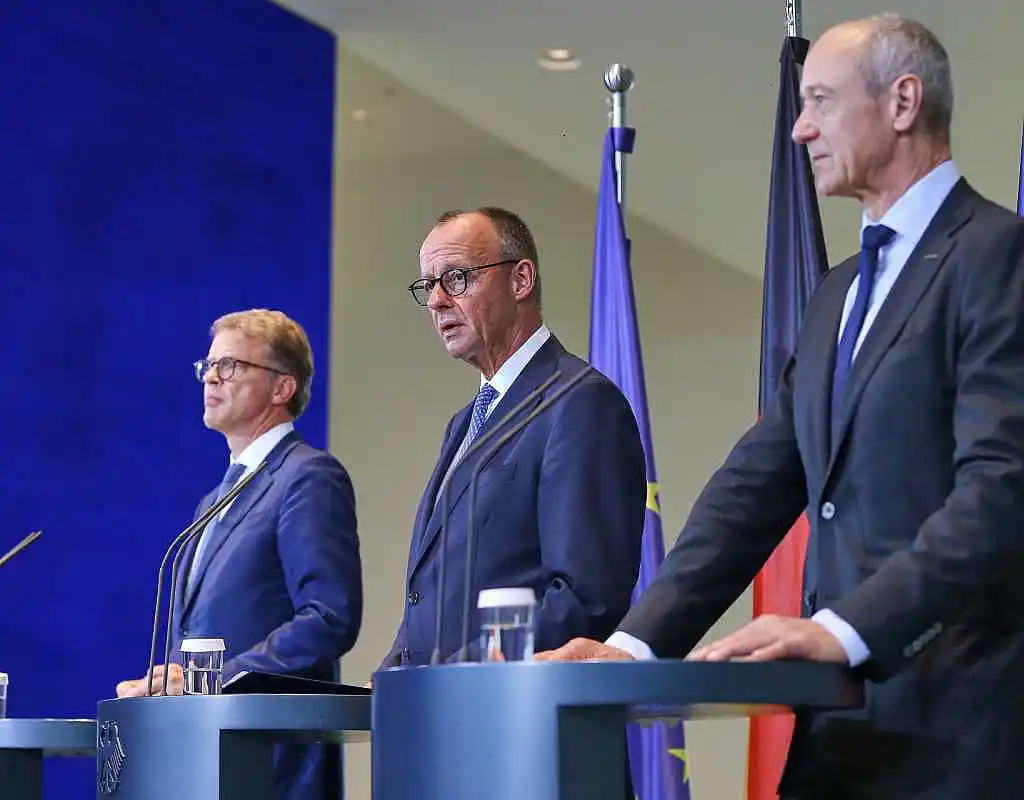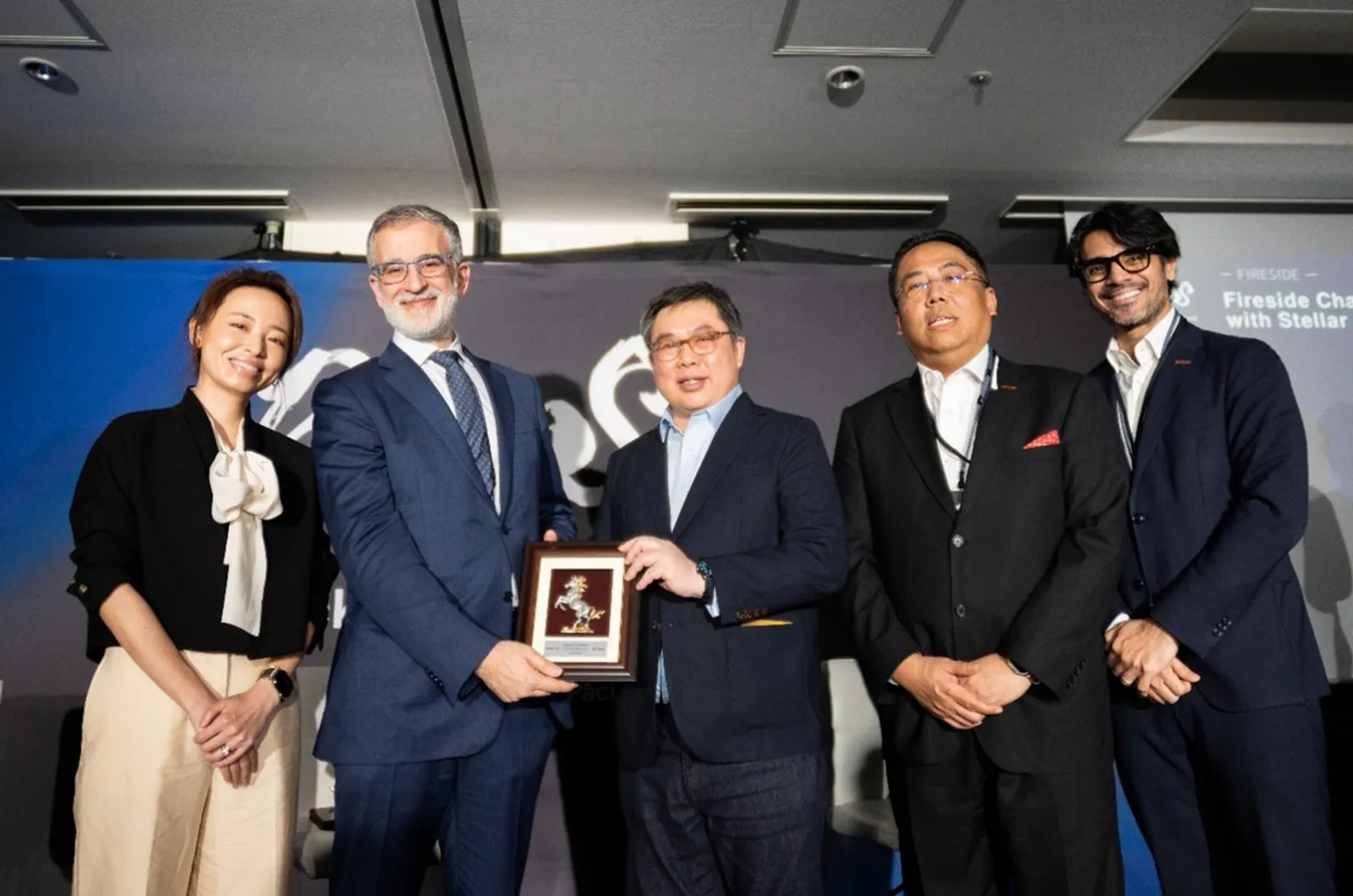In a powerful display of corporate commitment, approximately 60 of Germany’s most influential companies have united to launch a monumental “Made for Germany” investment initiative. This ambitious pledge, unveiled on Monday, aims to inject a staggering €631 billion into the nation’s economy by 2028, signaling a concerted effort to restore investor confidence after two challenging years of recession. The initiative comes at a critical juncture for Europe’s traditional economic powerhouse, which has seen its growth projections dwindle to some of the weakest among developed nations for 2025.
The high-stakes meeting, convened by Chancellor Friedrich Merz, brought together executives from 61 companies, including industrial titans like Siemens and financial behemoths such as Deutsche Bank. Their collective promise, presented to Merz and Finance Minister Lars Klingbeil, is not merely a financial commitment but a strategic blueprint designed to revitalize Germany’s industrial base, foster innovation, and address pressing structural challenges.
The “Made for Germany” Mandate: A Multi-Faceted Investment Push
The colossal €631 billion figure encompasses a broad spectrum of investments crucial for long-term economic health. According to the participating companies, this sum includes significant capital investments in new facilities, machinery, and technology; substantial expenditure on research and development (R&D) to drive innovation and maintain Germany’s competitive edge; and commitments from international investments, underscoring the global nature of these firms and their belief in Germany as a strategic hub.
This initiative is more than just a cash injection; it represents a renewed focus on the core strengths that once defined the “Made in Germany” label: precision engineering, technological leadership, and a robust industrial base. By channeling funds into these areas, the companies aim to reinforce Germany’s position in global value chains, particularly in high-tech manufacturing, renewable energy, and advanced digital solutions.
Siemens CEO Roland Busch, in an interview with Handelsblatt newspaper, provided crucial clarification on the nature of these funds. He emphasized that while a portion of the announced capital was “already committed,” a significant amount represented “fresh capital.” This distinction is vital, as it indicates a genuine acceleration and expansion of investment plans rather than merely a re-announcement of existing budgets. Busch’s accompanying statement, “We need the courage for structural changes in politics, and it is imperative that big steps follow,” highlights the corporate sector’s expectation that government policy must align with and facilitate these private sector efforts.
Germany’s Economic Labyrinth: Unpacking Two Years of Recession
Once lauded as the “engine of Europe” and a global export champion, Germany’s economy has faced an unprecedented downturn, grappling with a recession for two consecutive years. The current projections for 2025 paint a grim picture, with forecasts placing Germany’s growth among the lowest in the developed world. Understanding the root causes of this economic malaise is crucial to appreciating the urgency and scale of the “Made for Germany” initiative.
The Energy Crisis: A Geopolitical Aftershock
Perhaps the most immediate and impactful blow to Germany’s economy came from the energy crisis, largely triggered by the war in Ukraine and the subsequent cessation of cheap Russian natural gas supplies. For decades, Germany’s industrial sector, particularly its energy-intensive manufacturing, relied heavily on affordable Russian gas. The abrupt cut-off forced a rapid and costly pivot to alternative energy sources, including liquefied natural gas (LNG) imports, which come at a significantly higher price.
This surge in energy costs directly impacted the competitiveness of German industries, forcing some to scale back production, relocate parts of their operations, or absorb higher expenses, which then translated into increased prices for consumers. While Germany has made commendable strides in expanding its renewable energy capacity, the transition is ongoing, and the immediate energy landscape remains challenging for businesses. The high energy prices continue to be a major concern for German companies, eroding profit margins and deterring new investments.
Global Headwinds and Supply Chain Vulnerabilities
Beyond the domestic energy shock, Germany’s export-oriented economy has been particularly susceptible to global economic slowdowns. Weak demand from key trading partners, especially China, coupled with persistent supply chain disruptions exacerbated by geopolitical tensions and lingering effects of the pandemic, have significantly hampered German exports. Industries reliant on complex global supply chains, such as automotive and machinery, have faced delays, increased costs, and production bottlenecks.
Inflation, a global phenomenon, has also played a role, eroding consumer purchasing power and increasing operational costs for businesses. While inflation has shown signs of moderating, its lingering effects on consumer spending and investment decisions are still palpable.
Deep-Seated Structural Challenges
Beneath the surface of immediate crises, Germany’s economy has also contended with long-standing structural issues that have been brought into sharper focus by the recent downturn.
- Bureaucracy and Red Tape: The German regulatory environment, while often ensuring high standards, is frequently criticized for its complexity and slowness. Obtaining permits for new infrastructure projects, factory expansions, or even digital initiatives can be a protracted process, deterring investment and innovation. The companies at Monday’s meeting explicitly lobbied the government for “faster approvals for infrastructure projects,” highlighting this critical bottleneck.
- Aging Infrastructure: Despite its reputation for efficiency, parts of Germany’s physical and digital infrastructure are in need of significant modernization. Roads, bridges, and particularly high-speed internet connectivity in rural areas, lag behind some other developed nations, impacting logistics and the adoption of digital technologies.
- Skilled Labor Shortage: Germany faces a growing demographic challenge. An aging population and declining birth rates have led to a critical shortage of skilled workers across various sectors, from engineering and IT to healthcare and trades. This scarcity drives up labor costs and limits the capacity for growth and innovation. Addressing this “labour market shortage” was another key demand from the firms meeting with Chancellor Merz.
- Digitalization Lag: While strong in traditional industries, Germany has been perceived by some as slower in embracing comprehensive digitalization across its economy compared to some of its international peers. This impacts productivity, efficiency, and the ability to compete in the rapidly evolving global digital landscape.
Chancellor Merz’s Economic Revival Agenda: Policy and Promises
Chancellor Friedrich Merz has unequivocally made revitalizing Germany’s economy a cornerstone of his administration’s agenda since taking office. His public pronouncements and policy initiatives reflect a strong commitment to addressing the nation’s economic vulnerabilities. During his summer press conference last week, Merz underscored his coalition’s dedication to “taking the issue of cutting red tape really seriously,” a sentiment that resonates deeply with the business community.
The Debt Brake Reform and Infrastructure Fund
A significant development preceding Monday’s meeting was the recent reform to lift Germany’s stringent debt brake rules. The “Schuldenbremse,” enshrined in the German constitution, limits the structural deficit of the federal government to 0.35% of GDP. While designed to ensure fiscal discipline, critics argued it constrained necessary public investment, especially during economic downturns or for long-term strategic projects. The reform, a politically sensitive move, has now enabled an expected surge in government spending, particularly through the creation of a special fund dedicated to infrastructure investment.
This infrastructure fund is critical. It allows the government to channel significant public resources into modernizing the nation’s physical and digital backbone, complementing the private sector’s investment pledges. Improved infrastructure can reduce logistical costs for businesses, enhance connectivity, and create a more attractive environment for both domestic and international investors.
Expert Scrutiny: The Ifo Institute’s Assessment
Clemens Fuest, the astute president of Germany’s prestigious Ifo Institute for Economic Research, offered a nuanced perspective on the government’s economic policy. He acknowledged the positive signals emanating from the “Made for Germany” initiative and the establishment of the infrastructure fund, viewing them as encouraging steps towards promoting innovation and new businesses. These measures, he suggested, demonstrate a recognition of the need for proactive intervention.
However, Fuest also voiced concerns, pointing out that the German government has “adopted a series of measures that neither limit spending nor strengthen growth potential.” He specifically cited the “early-start pension plan,” which he described as “burdened by bureaucracy,” and the permanent reduction in value-added tax (VAT) in the hospitality sector.
- Early-Start Pension Plan: This refers to policies allowing certain workers to retire earlier, often with less stringent conditions. While socially appealing to some demographics, economists like Fuest argue that such plans can exacerbate the skilled labor shortage by reducing the available workforce and place an increasing financial burden on the social security system, potentially limiting funds for growth-oriented investments. The “bureaucracy” aspect suggests administrative inefficiencies in its implementation.
- VAT Reduction in Hospitality: While intended to support a sector hit hard by the pandemic, a permanent VAT reduction can be seen as a broad subsidy rather than a targeted growth stimulus. Critics might argue it doesn’t necessarily lead to significant long-term investment or productivity gains across the broader economy, and it reduces government revenue that could otherwise be allocated to more impactful growth initiatives.
Fuest’s overall assessment — “Overall, the review of the German government’s economic policy reveals pros and cons” — encapsulates the complex balancing act facing Merz’s coalition: addressing immediate economic pressures while laying the groundwork for sustainable long-term growth, all within a framework of fiscal responsibility and social welfare.
Corporate Demands: A Call for Action and Collaboration
The meeting between Chancellor Merz and Germany’s top executives was not a one-way street of pledges; it was also a forum for the business community to articulate its demands and expectations from the government. The companies are not just offering investment; they are seeking a more conducive operating environment.
Streamlining Approvals and Reducing Bureaucracy
The most prominent demand was for “faster approvals for infrastructure projects.” This extends beyond just large-scale public works to include permits for factory expansions, new industrial sites, and even the deployment of renewable energy projects. Bureaucratic delays can add years and significant costs to projects, making Germany less attractive for investment compared to countries with more agile regulatory frameworks. Companies are pushing for digitalized permit processes, clear timelines, and a more streamlined approach to regulatory compliance.
Tackling the Skilled Labor Shortage
Addressing Germany’s labor market shortage is paramount. The corporate sector is advocating for a multi-pronged approach:
- Immigration Policies: Attracting and integrating skilled workers from abroad is crucial. This involves simplifying visa processes, recognizing foreign qualifications, and providing support for integration.
- Vocational Training and Education: Investing in vocational training programs and aligning educational curricula with industry needs can help bridge the skills gap domestically.
- Upskilling and Reskilling: Programs to re-train and upskill the existing workforce, especially in areas like digitalization and green technologies, are essential.
- Demographic Solutions: While long-term, discussions around increasing birth rates and extending working lives are also part of the broader demographic challenge.
Ensuring Energy Security and Affordability
While not explicitly stated in the provided snippet, it is highly probable that German firms also lobbied for continued efforts to ensure energy security and, crucially, to bring down energy costs. Predictable and affordable energy supplies are fundamental for industrial competitiveness, and companies will be looking for government policies that support the long-term transition to renewables while ensuring stable interim solutions.
Accelerating Digitalization
The push for digitalization is another unspoken but critical demand. Businesses need robust digital infrastructure, support for digital transformation initiatives, and a workforce equipped with digital skills to remain competitive in the global economy. This includes investments in 5G networks, cloud computing, artificial intelligence, and cybersecurity.
Expert Opinions and Market Reaction: Cautious Optimism
The “Made for Germany” initiative has been met with a mix of cautious optimism and pragmatic skepticism from economic analysts and market observers.
Many experts view the sheer scale of the €631 billion pledge as a significant positive signal. It demonstrates that despite the current challenges, Germany’s leading companies retain a strong belief in the country’s long-term potential and are willing to back that belief with substantial capital. This collective commitment can help to shift negative narratives and potentially encourage further domestic and international investment.
However, the sentiment is tempered by the understanding that pledges are only the first step. The real challenge lies in the effective and timely implementation of these investments. Analysts will be closely watching for tangible progress on projects, job creation, and improvements in key economic indicators. There’s also the question of whether this private sector push will be sufficiently matched by government reforms, particularly in areas like bureaucracy and energy policy. If political “big steps” (as Roland Busch put it) do not follow, the impact of these investments could be diluted.
Financial markets are likely to react positively to the news in the short term, seeing it as a sign of renewed confidence and potential for future growth. However, long-term market sentiment will depend on the sustained execution of these plans and the broader economic environment. Investors will be looking for evidence that Germany is genuinely addressing its structural issues and returning to a path of robust, sustainable growth.
Challenges and the Path Forward
Despite the ambitious investment pledge, Germany’s economic revival faces several significant hurdles:
- Implementation Risk: The sheer scale and complexity of the planned investments mean that execution will be challenging. Delays in permitting, labor shortages, and unforeseen global events could impede progress.
- Global Competition: Germany operates in a highly competitive global landscape. Other nations are also aggressively pursuing investments in green technologies, digitalization, and advanced manufacturing. Germany must ensure its policies and investment climate remain attractive relative to its international peers.
- Geopolitical Volatility: Ongoing geopolitical tensions, particularly the war in Ukraine and shifting global trade dynamics, continue to pose risks to supply chains, energy security, and export markets.
- Sustainability and Green Transition: While many of these investments will likely align with Germany’s ambitious green transition goals, balancing economic competitiveness with strict environmental regulations will remain a delicate act. The energy transition itself requires massive investment and careful management to ensure energy security and affordability.
Conclusion: A Collaborative Endeavor for Germany’s Future
The “Made for Germany” initiative represents a powerful and much-needed collaborative effort between Germany’s corporate giants and its government. The €631 billion investment pledge is a strong vote of confidence in the nation’s future, signaling a determination to overcome the current economic headwinds. It underscores a shared understanding that revitalizing Germany’s economy requires not just financial muscle but also fundamental structural reforms, particularly in cutting red tape and addressing the skilled labor shortage.
Chancellor Merz’s commitment to these reforms, coupled with the strategic use of the new infrastructure fund, provides a crucial governmental framework for these private sector investments to flourish. While challenges remain, and the path to full recovery may be arduous, this concerted push offers a beacon of hope. The success of this initiative will ultimately hinge on the sustained commitment of both industry and government to implement the necessary changes, ensuring that the “Made in Germany” label once again signifies not just quality and precision, but also dynamism, innovation, and robust economic growth on the global stage. The eyes of Europe, and indeed the world, will be watching closely as Germany embarks on this critical journey of economic renewal.
Ready to take your career to the next level? Join our dynamic courses: ACCA, HESI A2, ATI TEAS 7 , HESI EXIT , NCLEX – RN and NCLEX – PN, Financial Literacy!🌟 Dive into a world of opportunities and empower yourself for success. Explore more at Serrari Ed and start your exciting journey today! ✨
Photo source: Google
By: Montel Kamau
Serrari Financial Analyst
22nd July, 2025
Article, Financial and News Disclaimer
The Value of a Financial Advisor
While this article offers valuable insights, it is essential to recognize that personal finance can be highly complex and unique to each individual. A financial advisor provides professional expertise and personalized guidance to help you make well-informed decisions tailored to your specific circumstances and goals.
Beyond offering knowledge, a financial advisor serves as a trusted partner to help you stay disciplined, avoid common pitfalls, and remain focused on your long-term objectives. Their perspective and experience can complement your own efforts, enhancing your financial well-being and ensuring a more confident approach to managing your finances.
Disclaimer: This article is for informational purposes only and does not constitute financial advice. Readers are encouraged to consult a licensed financial advisor to obtain guidance specific to their financial situation.
Article and News Disclaimer
The information provided on www.serrarigroup.com is for general informational purposes only. While we strive to keep the information up to date and accurate, we make no representations or warranties of any kind, express or implied, about the completeness, accuracy, reliability, suitability, or availability with respect to the website or the information, products, services, or related graphics contained on the website for any purpose. Any reliance you place on such information is therefore strictly at your own risk.
www.serrarigroup.com is not responsible for any errors or omissions, or for the results obtained from the use of this information. All information on the website is provided on an as-is basis, with no guarantee of completeness, accuracy, timeliness, or of the results obtained from the use of this information, and without warranty of any kind, express or implied, including but not limited to warranties of performance, merchantability, and fitness for a particular purpose.
In no event will www.serrarigroup.com be liable to you or anyone else for any decision made or action taken in reliance on the information provided on the website or for any consequential, special, or similar damages, even if advised of the possibility of such damages.
The articles, news, and information presented on www.serrarigroup.com reflect the opinions of the respective authors and contributors and do not necessarily represent the views of the website or its management. Any views or opinions expressed are solely those of the individual authors and do not represent the website's views or opinions as a whole.
The content on www.serrarigroup.com may include links to external websites, which are provided for convenience and informational purposes only. We have no control over the nature, content, and availability of those sites. The inclusion of any links does not necessarily imply a recommendation or endorsement of the views expressed within them.
Every effort is made to keep the website up and running smoothly. However, www.serrarigroup.com takes no responsibility for, and will not be liable for, the website being temporarily unavailable due to technical issues beyond our control.
Please note that laws, regulations, and information can change rapidly, and we advise you to conduct further research and seek professional advice when necessary.
By using www.serrarigroup.com, you agree to this disclaimer and its terms. If you do not agree with this disclaimer, please do not use the website.
www.serrarigroup.com, reserves the right to update, modify, or remove any part of this disclaimer without prior notice. It is your responsibility to review this disclaimer periodically for changes.
Serrari Group 2025
















